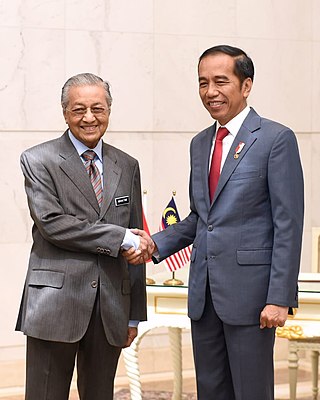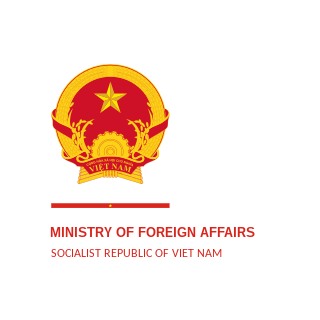
Since independence, Indonesian foreign relations have adhered to a "free and active" foreign policy, seeking to play a role in regional affairs commensurate with its size and location but avoiding involvement in conflicts among major powers. During the presidency of Sukarno, Indonesia's foreign relations were marked by engagement with other newly independent nations in Asia and Africa, as exemplified by the Bandung Conference, the subsequent foundation of the Non-Aligned Movement and a confrontational attitude towards Western powers, justified by a belief in the CONEFO and opposition to what Sukarno termed as NEKOLIM.

Malaysia is an active member of various international organisations, including the Commonwealth of Nations, the United Nations, the Organisation of Islamic Cooperation, and the Non-Aligned Movement. It has also in recent times been an active proponent of regional co-operation.

The Ministry of Foreign Affairs is an executive department of the Government of Japan, and is responsible for the country's foreign policy and international relations.

The Department of Foreign Affairs and Trade (DFAT) is the department of the Australian federal government responsible for foreign policy and relations, international aid, consular services and trade and investment. Australia's total official development assistance (ODA) decreased in 2022 due to differences in Australia's financial year reporting and the timing of its COVID-19-related expenditure, representing 0.19% of gross national income (GNI).

The Department of Foreign Affairs is the executive department of the Philippine government tasked to contribute to the enhancement of national security, protection of the territorial integrity and national sovereignty, to participate in the national endeavor of sustaining development and enhancing the Philippines' competitive edge, to protect the rights and promote the welfare of Filipinos overseas and to mobilize them as partners in national development, to project a positive image of the Philippines, and to increase international understanding of Philippine culture for mutually-beneficial relations with other countries.

The Ministry of Foreign Affairs is the governmental body responsible for conducting foreign relations of the Republic of Turkey. The Ministry is responsible for Turkey's diplomatic missions abroad and for the promotion of Turkish culture, as well as for implementing the country's foreign policy in accordance with its national interests. Established on 2 May 1920, its primary duties are administering diplomatic missions, negotiating international treaties and agreements, and representing the Republic of Turkey at the United Nations. The ministry is headquartered in the Turkish capital of Ankara and counts on more than 200 missions as embassies, permanent representation offices and consulates general, abroad. As of 2021, the Ministry of Foreign Affairs maintains 235 diplomatic posts worldwide. The current Minister of Foreign Affairs is Hakan Fidan, who has held the position since 3 June 2023.

Ministry of Foreign Affairs of Azerbaijan is a Cabinet-level governmental agency of Azerbaijan Republic in charge of conducting and designing the country's foreign policy.

The Federal Public Service Foreign Affairs, Foreign Trade and Development Cooperation is the foreign affairs ministry of Belgium and is responsible for Belgian foreign policy, relations with the European Union, development cooperation policy and certain aspects of foreign trade policy. The central government in Brussels directs the network of diplomatic and consular representations abroad.
The Ministry of Foreign Affairs is a cabinet ministry of the Government of Sri Lanka responsible for conducting and managing Sri Lanka's foreign relations through oversight of its missions abroad via the Sri Lanka Overseas Service, as well as drafting and general implementation of the nation's foreign policy.

The Ministry of Foreign Affairs and European Integration is one of the fourteen ministries of the Government of Moldova.

The Ministry of Foreign Affairs of the Republic of Belarus is the Belarusian government ministry which oversees the foreign relations of Belarus.

The Ministry of Foreign Affairs of the Republic of Serbia is the ministry in the government of Serbia which is in the charge of maintaining the consular affairs and foreign relations of Serbia. The current minister is Ivica Dačić, in office since 26 October 2022.

The Ministry of Defence, abbreviated MINDEF or KEMENTAH, is a ministry of the Government of Malaysia that is responsible for defence, national security, army, navy, hydrography, air force, armed forces, intelligence services, counterintelligence, military intelligence, national service, and veterans affairs.
The Ministry of Foreign and European Affairs of the Republic of Slovenia is an executive department of the Government of Slovenia responsible for relations with other countries and international organisations, monitoring of the international political and economic situation, and strengthening of Slovenia's relations with other countries and international organisations.

The Ministry of Foreign Affairs of the Republic of Indonesia or commonly known by its abbreviation Kemlu, is an Indonesian government ministry responsible for the country's foreign politics and diplomacy. The ministry was formerly known as the Department of Foreign Affairs until 2008 when the nomenclature changed with the enactment of the 2008 State Ministry Act.

The Ministry of Foreign Affairs is the central government institution charged with leading the foreign affairs of Vietnam. The current Foreign Minister is Bùi Thanh Sơn.

Dato' Dr. Fauziah binti Mohamad Taib is a Malaysian diplomat and published author. She was previously the Ambassador to the Kingdom of the Netherlands, a post she held from 13 August 2008 until her retirement in 2015. She also served as the Permanent Representative of Malaysia to the Organisation for the Prohibition of Chemical Weapons (OPCW), which is based in The Hague.
The Malaysian Friendship and Trade Centre is the representative office of Malaysia in Taiwan in the absence of diplomatic relations.

The Chief of Protocol (CoP) is a government official who heads the protocol department of a state, overseeing security, logistics and etiquette in diplomatic and national functions. A protocol department decides on diplomatic immunity and privileges, diplomatic host security, diplomatic use of airspace and it is the guardian of official etiquette. Advance protocol teams, usually headed by the Chief of Protocol, engage as first contact between governments for the planning of bilateral and multilateral summits and visits.

The Ministry of External Relations of the Dominican Republic is the government institution in charge of foreign affairs. It's responsible of coordinating the foreign policy of the Dominican Republic along the President, in accordance with Article 128 of the Constitution. It is commonly known as the Chancellery (Cancillería)


















